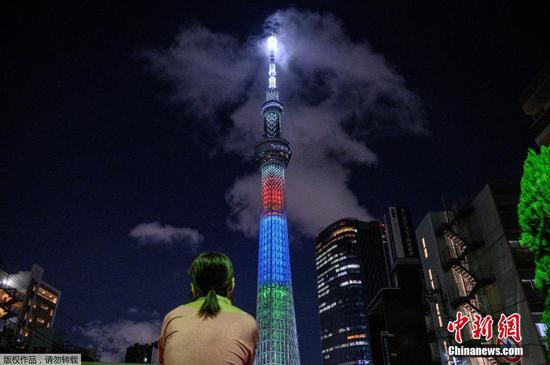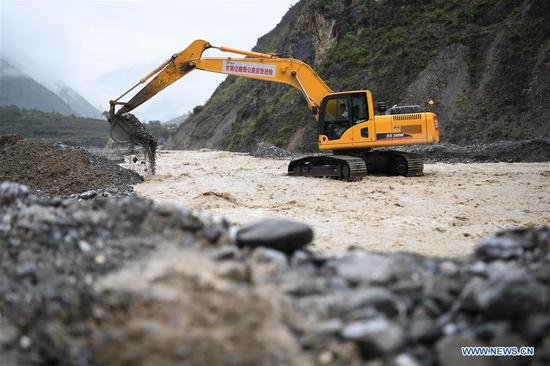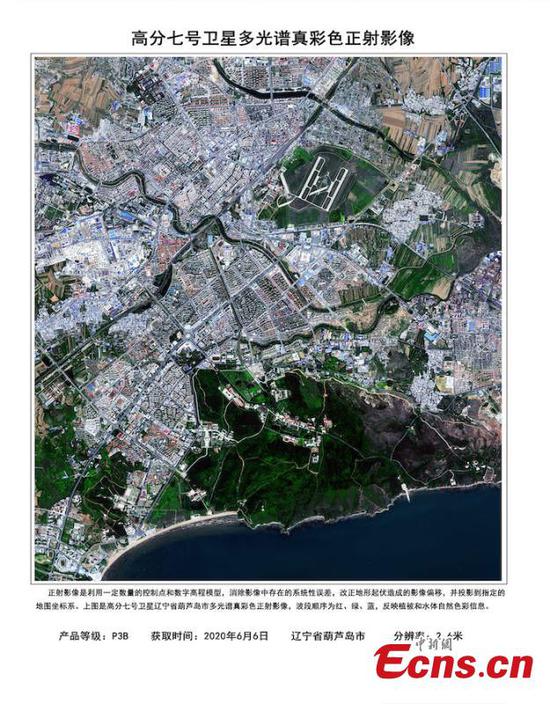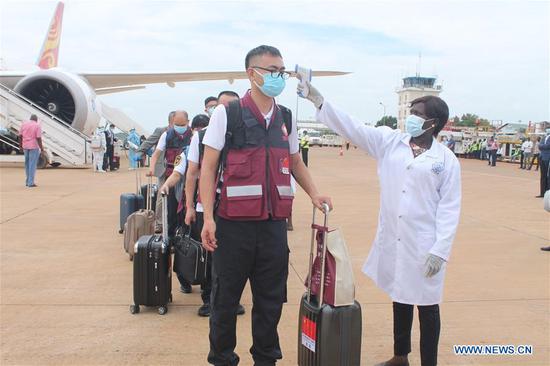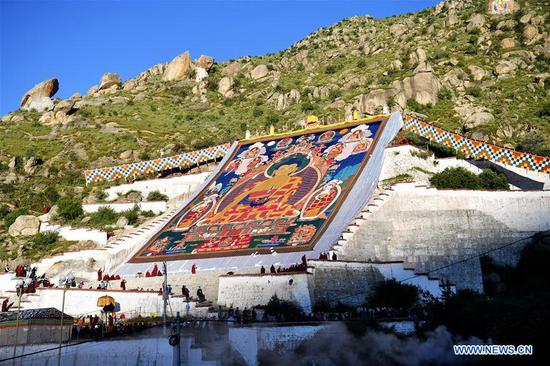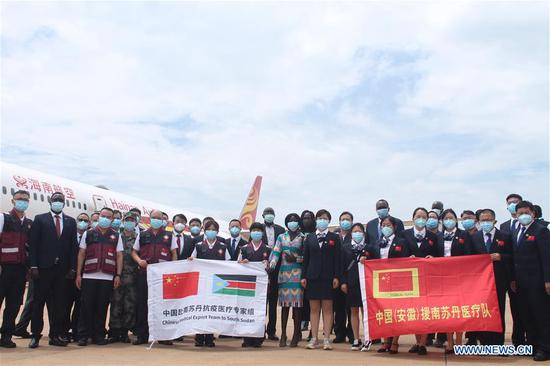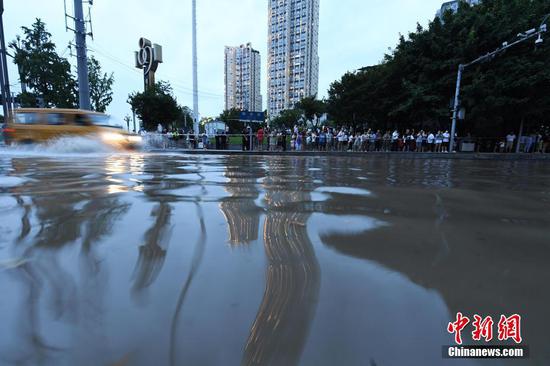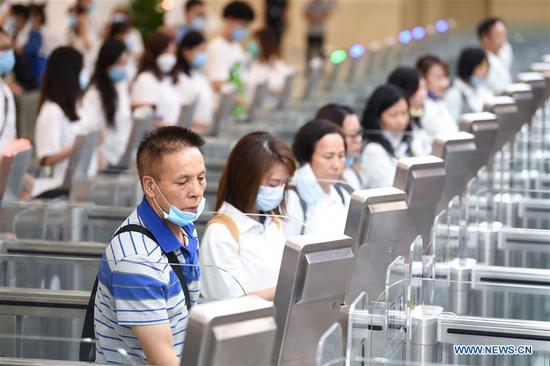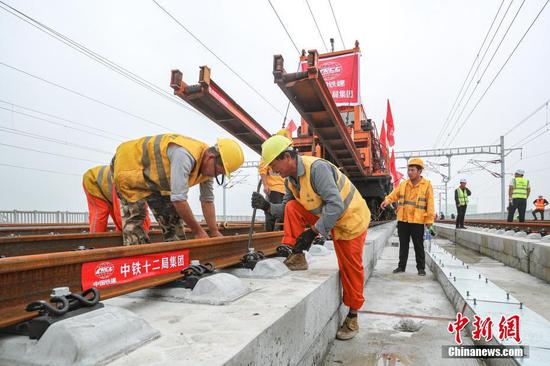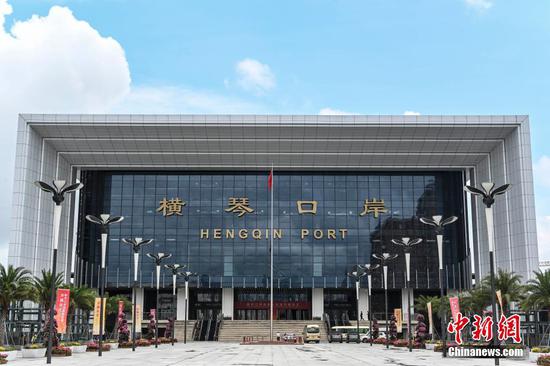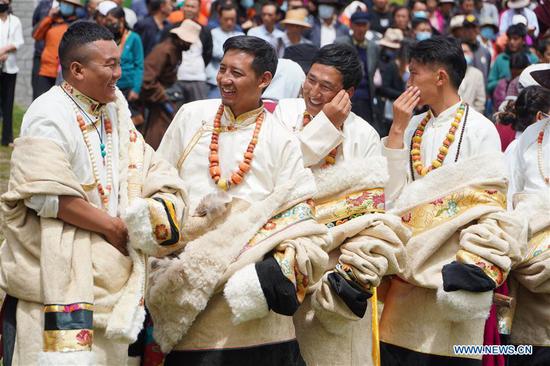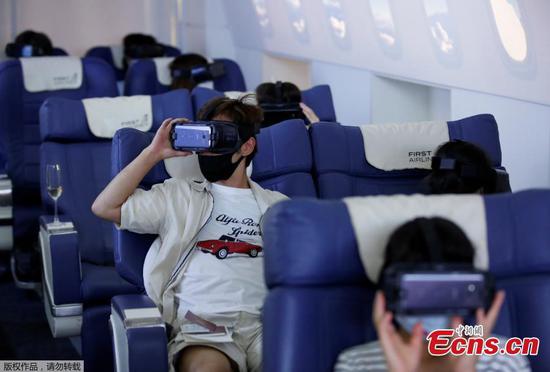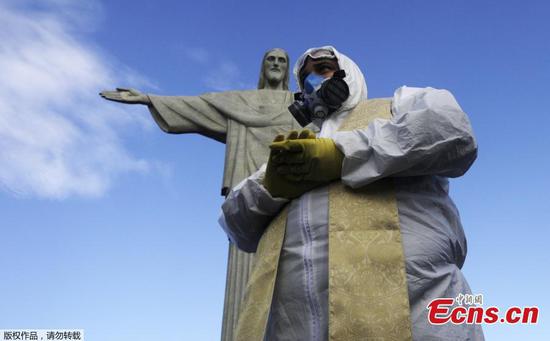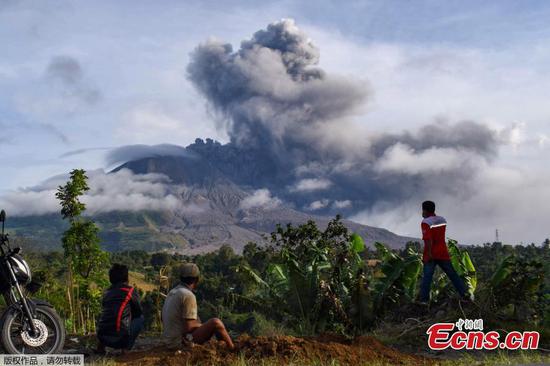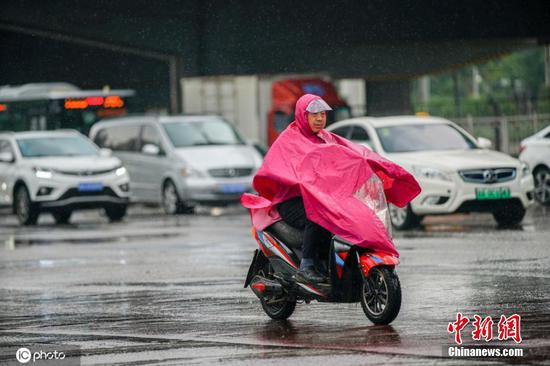U.S. Secretary of State Mike Pompeo, in his recent speech at the Richard Nixon Presidential Library, negated every aspect of China-U.S. relations, maliciously attacked the leadership of the Communist Party of China (CPC) and China's political system, and attempted to drive a wedge between the CPC and the Chinese people. He also wantonly criticized China's domestic and foreign policies, spread the so-called "China threat", and called for an anti-China alliance to contain China's development.
Pompeo's baseless, fact-distorting speech misrepresents history and the reality. It is full of ideological prejudice and driven by a Cold-War mentality. His remarks have not only been condemned by the Chinese people, but also criticized and opposed by sensible people in the United States as well as the international community.
To debunk the lies fabricated by Pompeo, let the facts speak for themselves.
1. Mike Pompeo: The Chinese people are completely distinct from the Chinese Communist Party (CCP). The biggest lie that they tell is to think that they speak for 1.4 billion people. The CCP fears the Chinese people's honest opinions more than any foe.
False.
Fact check: The Communist Party of China (CPC) does not have any special interest of its own. It takes seeking happiness for the Chinese people and rejuvenation for the Chinese nation as its original aspiration and founding mission. It represents the fundamental interests of the greatest possible majority of the Chinese people and remains dedicated to wholeheartedly serving the people. The CPC believes that all is by the people and for the people. It puts the people's interests first, with safeguarding the people's interests as the starting point and ultimate goal of all of its work. Under the leadership of the CPC, the Chinese people have won independence, freedom and liberation, and continued to make great achievements in the process of national construction and development.
-- The CPC comes from the people and is rooted in the people. The CPC's position of leadership is the choice of history and the people. Since its founding 99 years ago, the CPC has grown from a small party with just more than 50 members to a large party with nearly 100 million members. The CPC is deeply rooted in the Chinese people and closely linked to them, and has maintained its great vitality. By the end of 2019, the CPC had 91.914 million members and 18.992 million applicants for Party membership. It is the world's largest party that governs the world's most populous country on a long-term basis. No one can turn a blind eye to the fact that the CPC is supported by the Chinese people. James Palmer, senior editor with the U.S. magazine Foreign Policy, noted that the CPC is deeply woven into the fabric of ordinary Chinese life. It is a common belief that "without the party, there would be no new China" and trust in the CPC is the mainstream public opinion in China.
-- Kishore Mahbubani, a professor at the National University of Singapore and former Singaporean ambassador to the United Nations, wrote, in an article carried by The National Interest, that while Pompeo claimed that the Chinese people are completely distinct from the CPC, the fact is that each year a large number of Chinese apply to join the CPC and only a small number of them get in, making it as difficult to join the CPC as it is to get into leading universities in America. The CPC is not a party about to crack up under American pressure as it is floating on an ocean of legitimacy among 1.4 billion Chinese people.
-- The CPC upholds a thinking of development that puts the people in the center. Under the leadership of the CPC, China has seen its per capita GDP increase from less than 120 yuan in the early 1950s to more than 70,000 yuan today, the basic needs of nearly 1.4 billion people well met, impoverished population drop by 850 million, employment provided for 770 million people, and basic support extended to the 250 million elderly people, 85 million people with disabilities and more than 60 million urban and rural people living on subsistence allowance. China, with a population of nearly 1.4 billion, has made a historic leap forward from poverty, to a life of subsistence and to one of moderate prosperity. China has put in place the world's largest systems for education, social security, health care and democratic elections at the primary level.
-- Since the COVID-19 outbreak, the CPC and the Chinese government have put the people and their lives front and center, saving lives at all costs and protecting people's health and safety. Everything possible has been done to treat every patient, whether he or she is 108 years old or a new-born baby. China has scored major strategic achievements in bringing the virus under control. China's economic growth shifted from negative to positive territory in the second quarter this year, up 3.2 percent. China's economy is seeing the resumption of growth and steady recovery. Experts from the Institute of International Finance, UBS and other well-known international institutions, as well as media outlets, have expressed optimism about China's economic prospects.
-- At the height of the COVID-19 epidemic when the people's lives and safety were in grave danger, upon a call for action from the CPC Central Committee, Party members and officials came to the fore. More than 4.6 million primary-level Party organizations operated in full gear. From racing against the clock to save more lives in intensive care units to visiting urban and rural communities for possible infections, from working overtime for production of supplies in factory workshops to pursuing a breakthrough in virus research at laboratories, more than 39 million Party members had been working day and night at the front-line to fight the epidemic. In this process, nearly 400 Party members laid down their lives, as they, together with other CPC members, faced danger squarely. The Party flag has always flown high at the front line. All of these speak to the fact that CPC organizations at all levels have acted as strong bastions against the virus and Party members and officials have played an exemplary role. They are the mainstay of the country in this fight.
-- In August 2018, Ipsos, a well-known market research company in the world, released a report titled What Worries the World. It found that China led the world in national optimism as 91 percent of its people believe that their country is going on the right track. China claimed the top spot in 28 countries surveyed, leaving the United States far behind in the ranking.
-- In May 2020, Edelman, a renowned communications firm headquartered in the United States, updated its report of Trust Barometer. It revealed that the Chinese people have 95 percent trust in their government, making the country the top of the countries surveyed, whereas the United States was placed next to last, in the territory of distrust.
-- In July 2020, the Ash Center for Democratic Governance and Innovation at Harvard Kennedy School made public a survey titled Understanding CCP Resilience: Surveying Chinese Public Opinion Through Time. It found that Chinese citizen satisfaction with government has increased virtually across the board since 2003, and people in poorer, inland regions are actually comparatively more likely to report increases in satisfaction. Breakdown data also showed a near-universal upturn in the people's satisfaction toward all four levels of government from 2003 to 2016, with approval ratings running as high as 93.1 percent.
-- The China Data Lab in the University of California, San Diego, recently released an article, saying that the Chinese public's trust in and support of their government have grown from strength to strength. They have significantly rallied since the outbreak of the COVID-19 epidemic. According to this survey, as of May 2020, the average level of trust in the central government has jumped to 8.87 on a scale of one to 10, and 83 percent of respondents agreed or strongly agreed to the statement that they prefer living under China's political system as compared to others.
-- Unlike what the CPC has done for the people in coping with COVID-19, politicians in the United States held on to the primacy of personal political gains and "capital first". To this end, they played down the epidemic, ignored science, and even resorted to blame game. The result is a major outbreak that has taken a heavy toll on Americans' lives and health. According to media tallies in May, more than one third of coronavirus deaths in America's 31 states came from nursing homes.
By Aug. 24, the United States had recorded a cumulative total of 5.69 million confirmed cases, more than 63 times of that in China. More than 170,000 people had died, equivalent to about 540 deaths per million, which were 37 times and 160 times the corresponding numbers in China. With a population of four percent of the world's total, the United States made up 24 percent of global infections and 22 percent of global deaths.
The public's anxiety has continued to climb up. Some 81 percent of Americans in a recent poll reported feeling "very concerned" or "somewhat concerned" about the virus. A latest NPR/Ipsos poll released on Aug. 4 found that two thirds of respondents said they believe the United States is handling the epidemic worse than other countries. Among them, 41 percent contended that the country's performance is "much worse" than that of other countries, while 25 percent rated the performance as being "somewhat worse."
Americans have come to a pretty dire place in the combat, said a pollster with Ipsos, and they are looking for sweeping, really broad, powerful action. The U.S. economy has suffered a heavy blow as its GDP contracted at an annualized rate of 32.9 percent in the second quarter, the deepest drop in output since record began in 1947. Fitch, one of the three major credit rating agencies in the world, revised its outlook on the country's sovereign rating from "stable" to "negative."
2. Mike Pompeo: China is not a free country, as 1.4 billion Chinese are surveilled and oppressed. China is repeating some of the same mistakes that the Soviet Union made - rejecting property rights and predictable rule of law.
False.
Fact check: China practices socialism with Chinese characteristics. An essential feature of the socialist democracy is that the people are the masters of the country. The socialist political system with Chinese characteristics upholds the unity of Party leadership, the running of the country by the people, and law-based governance, and features enhancing institutional safeguards for the running of the country by the people.
-- China achieved freedom from the oppression of imperialism and colonialism. Freedom, democracy and rule of law are codified in China's Constitution. They are also part of the core values of socialism with Chinese characteristics. In 1997, the 15th CPC National Congress committed to "...ensuring that the people enjoy extensive rights and freedom endowed by law, and respecting and guaranteeing human rights." In 2007, respecting and guaranteeing of human rights was added into the CPC Constitution for the first time. In 2017, the 19th CPC National Congress established Xi Jinping Thought on Socialism with Chinese Characteristics for a New Era as the guiding thinking of the CPC, and categorically stated that the CPC should "strengthen legal protection for human rights to ensure that the people enjoy extensive rights and freedoms as prescribed by law," and stressed protecting people's personal rights, property rights, and right to dignity. The Chinese government earnestly respects and fully protects the human rights and freedoms of Chinese citizens in accordance with China's Constitution and other laws.
-- On May 28, 2020, the third session of the 13th National People's Congress adopted the Civil Code of the People's Republic of China, representing an important milestone in the country's advancement of socialist rule of law in the new era. With seven parts, 1,260 articles and more than 100,000 words, the civil code was compiled based on systematically incorporating and modifying existing civil laws and regulations formulated in different periods, including the general principles of the civil law and laws on real rights, contract, guarantee, marriage, adoption, inheritance, tort liability and personality rights. It adjusts personal and property relations between natural persons, legal persons and other civil subjects, and provides equal protection of rights in various areas including safeguarding life and health, property safety, convenient transactions, people's happiness and dignity.
-- China safeguards freedom of religious belief in accordance with the law. The country has nearly 200 million religious believers, more than 380,000 clerical personnel, and about 140,000 places of worship registered for religious activities. The scriptures of Islam, Buddhism and Christianity among other religions have been translated, published and distributed in multiple languages. In Tibet Autonomous Region, there are 1,787 religious venues which house more than 46,000 Buddhist monks and nuns. Xinjiang Uygur Autonomous Region has 24,800 religious venues including mosques, churches, temples and Taoist abbeys; there is one mosque for 530 Muslims on average in the region; the number of clerical personnel is 29,300; students have access to undergraduate programs in Islamic institutes; and more than 1.76 million copies of the Quran and Selections from Sahih of al-Buhari have been distributed.
-- Liberty does not mean a free rein, and science, reason, law, order and international rules are all foundations of liberty. Liberty, says Montesquieu in "The Spirit of the Laws," is a right of doing whatever the laws permit, and if a citizen could do what they forbid, he would be no longer possessed of liberty. Freedom has boundaries. Even the so-called "free nations" delimit a "no-go zone" for liberty and never allow anyone to challenge the bottom line of the legal system. The Chinese government has the power conferred by the law to take various measures to safeguard national unity, ethnic solidarity and social stability. It is also duty-bound to protect the lawful rights and interests of the vast majority of the people by taking these measures. The exercise of its power and the fulfillment of its duties fall within China's domestic affairs and no interference from external forces will be tolerated.
-- The constitutions of more than 100 countries provide that the exercise of fundamental rights and freedoms should not jeopardize national security. The International Covenant on Civil and Political Rights stipulates that the freedom to manifest one's religion or beliefs, the right to freedom of expression, the right of peaceful assembly, and the right to a public trial among other rights may be subject to limitations that are necessary to protect public safety or order. The European Convention on Human Rights also has similar provisions. The United States, Britain, Canada and Australia among other countries have built strict legal systems to safeguard national security and stay tough on fighting crimes endangering national security.
3.Mike Pompeo: The United States is a beacon of freedom for people all around the world, including people inside of China.
False.
Fact check: The United States proclaims itself as a "beacon of freedom," which is no more than an illusion that deceives both its people and the world. According to a survey conducted by the Associated Press-NORC Center for Public Affairs Research, 80 percent of Americans say the country is headed in the wrong direction, an all-time high in AP-NORC surveys. According to a poll published by the Pew Research Center on July 1, only 12 percent of Americans say they are satisfied with the way things are going in the country, while 87 percent say they are dissatisfied, and most Americans are dissatisfied with how the government operates. According to a Gallup poll, American pride has reached the lowest point in two decades, with only 20 percent of Americans satisfied with the way things are going in their country. Extreme pride among whites has fallen below 50 percent for the first time and non-whites 24 percent.
-- The United States is highly unpopular around the globe, as only one third of people across the world acknowledge the United States' leading position. A survey by the European Council on Foreign Relations shows that people from multiple countries are losing their trust in the United States. Researchers conducted the survey among 11,000 people from nine European countries, and over two thirds of respondents from Germany, France, Spain and Denmark said that their views of the United States have worsened. The country's reputation dropped particularly drastically in France and Germany, as 46 percent of French respondents and 42 percent of German respondents said the United States' image has "severely worsened" due to COVID-19. The 2020 Best Countries report also showed that the world's trust in the United States has dropped by more than 50 percent since 2016, the sharpest drop of any country assessed in the report.
-- An annual survey report published by Gallup on July 27 showed that "U.S. leadership remains unpopular worldwide." The "free world" proclaimed by the United States, in particular, disapproves U.S. leadership. The approval of U.S. leadership is at its lowest among the country's traditional allies in Europe, where 61 percent of respondents disapprove of its performance, and only 24 percent approve of it. In the United Kingdom, the figure is 65 percent disapprove, with a similar outcome in France. In Germany, the U.S. stature is even worse, as 78 percent disapprove the leadership coming from Washington. In Australia, whose government follows closely its U.S. counterpart, there is deep skepticism about the United States as well, with 67 percent disapproving its performance.
-- Tara D. Sonenshine, former U.S. undersecretary of state for public diplomacy and public affairs and currently a fellow in public diplomacy at the George Washington University School of Media and Public Affairs, recently said that the United States is losing its global leadership, with its international reputation hitting the bottom and its allies giving up on it. Over the past few years, many of the key policies put forward by the United States are broadly unpopular around the globe, especially the "America-first" principle which provoked discontent among many of its allies. According to a new Pew Research Center survey spanning 37 nations, just 20 percent of the respondents has confidence in Trump to do the right thing when it comes to international affairs.
-- U.S. citizens' personal dignity and privacy suffer systematic violation. The Dallas Morning News reported last December that Texas is home to eight secretive surveillance centers, supported jointly by federal, state and local law enforcement departments, which share information and monitor social media and other online forums for potential threats. A report of the U.S. Government Accountability Office released in June 2019 said that the FBI's Facial Analysis, Comparison, and Evaluation Services Unit may search at its will in the database of over 641 million face photos without any legal permission.
-- The United States lacks sufficient protection of ethnic minorities' human rights and fundamental freedoms. Ethnic minorities in the country suffer bullying and exclusion, facing long-term, widespread and systematic discrimination in the political, economic, cultural and social areas. For American Indians alone, the U.S. government, for a long time, implemented compulsory policies of ethnic extinction, isolation and assimilation against them.
In nearly 100 years after the United States of America was founded, the country drove out and killed American Indians on a large scale during the Westward Movement. By the beginning of the 20th century, the number of American Indians within the border of the United States dropped sharply to 250,000 from five million in 1492. Currently, American Indians only account for two percent of the country's total population.
Since the COVID-19 outbreak, African Americans are over four times more likely to catch the disease than white Americans, with much higher mortality rates as well, highlighting racial inequality in the country. Fatal police shootings are not uncommon either, with the number of such cases reaching 1,004 in 2019 alone. Among the 7,036 bias-induced hate crime cases reported by U.S. law enforcement agencies in 2018, 57.5 percent were motivated by a race, ethnicity or ancestry bias. Furthermore, of hate crimes motivated by race, ethnicity or ancestry, 46.9 percent were against African Americans. African Americans accounted for 47.1 percent of the 5,155 victims of race-based hate crimes. On May 25, 2020, George Floyd, an African American man in the state of Minnesota, was killed by a white police officer, triggering large-scale protests across the United States. The United Nations Human Rights Council held an urgent debate and adopted a resolution, strongly condemning the incident and calling for the United States to take concrete measures to protect the human rights and fundamental freedoms of African Americans.
-- The United States has the widest wealth gap among Western countries. In January 2017, the Business Insider published a chart by Torsten Slok, Deutsche Bank's chief international economist, which showed the share of U.S. household wealth by income level. Notably, the top 0.1 percent of households hold about the same amount of wealth as the bottom 90 percent. From 1989 to 2018, the bottom 50 percent of families saw basically no net increase in their wealth. In light of COVID-19, employers in the United States have laid off tens of millions of employees since this February, dealing a particularly heavy blow to low-income workers and dragging the employment rate 35 percent lower than the pre-COVID-19 level.
-- The United States suppresses the media and restricts freedom of the press. The Washington Post reported in April 2019 that for the third time in three years, the United States' standing in an annual index of press freedom declined. In 2019, 38 journalists in the country suffered attacks; journalists were rejected from attending government open events for 28 times; and nine journalists were arrested or faced criminal charges. Media organizations including The New York Times and The Hill in the United States and The Guardian in the United Kingdom frequently reported news of journalists being attacked or arrested while reporting the protests concerning George Floyd, with 148 journalists involved from May 26 to June 2 alone -- 40 journalists were shot by gun; 34 physically assaulted by police; 33 arrested or detained; and one female photojournalist even permanently lost vision in her left eye after being shot by a rubber bullet. A report by The Guardian in December last year said the current U.S. administration "has dealt the most sustained assault on press freedom in U.S. history."
-- Abusing the concept of national security, the U.S. administration uses national resources to smear, attack, encircle and contain Chinese private companies including Huawei, ByteDance and Tencent, forbid U.S. service providers from purchasing equipment made by Huawei and ZTE, and ban Chinese social media applications such as TikTok and WeChat. The acts violate market principles of fair and free competition. This is sheer daylight robbery. How can such a country serve as the beacon for the Chinese people?
-- On July 25, The Atlantic published an article titled "Pompeo's surreal speech on China" by Thomas Wright, a senior fellow at the Brookings Institution. He pointed out that Pompeo said the United States will organize the "free world" while alienating and undermining the "free world." Pompeo extolled democracy while aiding and abetting its destruction at home in the United States. Pompeo praised the Chinese people while generalizing about the ill intent of Chinese students who want to come to America. Pompeo's tirade will discredit the case for competition with China among U.S. allies, in Asia and Europe, who are petrified of a full-blown Cold War between the United States and China, Wright said.
4.Mike Pompeo: China seeks global hegemony. China threatens international agreements and treats international agreements as conduits for global dominance.
False.
Fact check: The Constitution of the Communist Party of China and the Constitution of the People's Republic of China (PRC) have made it clear that China follows a path of peaceful development and opposes hegemony. No matter what stage of development it reaches, China will never seek hegemony or engage in expansion. That's what China says, and also what it does. Since its founding 70 years ago, the PRC has never started any war or occupied an inch of the land of others. In contrast, the United States has never made such policy announcement. In a speech delivered by former U.S. President Jimmy Carter in 2019, he pointed out that the United States had only enjoyed 16 years of peace in its history of more than 240 years, making the country "the most warlike nation in the history of the world."
-- China firmly upholds the international system with the United Nations at its core and an international order based on international law, including a series of international conventions signed within the UN framework. China actively advocates a new type of international relations featuring win-win cooperation, develops all-round friendship and cooperation with other countries, and establishes a global network of partnerships. China is committed to building a community with a shared future for mankind. It advocates an international order that features fairness and justice and calls for global cooperation through extensive consultation, joint contribution and shared benefits and for upholding justice while pursuing shared interests. It has all along worked to safeguard the norms governing international relations, the multilateral system and stability of the international order. According to UN Secretary-General Antonio Guterres, China has become an important pillar of the multilateral system, with the aim to establish a community with a shared future for mankind through practicing multilateralism.
-- As the first founding member to sign the UN Charter, China firmly upholds its purposes and principles and honors the spirit of contract and the international rule of law. China has all along kept its promises, followed rules and fulfilled agreements. China opposes acts that undermine the authority and sanctity of international law, including unauthorized use of force and withdrawal from treaties and organizations. China is also the second-largest contributor to the UN regular budget and peacekeeping operations, actively fulfilling its financial obligations to the UN as a developing country.
-- China has signed or joined 20 multilateral arms control, disarmament and non-proliferation treaties, including the Treaty on the Non-Proliferation of Nuclear Weapons. It also actively participates in the international arms control, disarmament and non-proliferation process, opposes arms race, and safeguards global strategic balance and stability. China has also voluntarily downsized its military personnel by over 4 million since reform and opening up.
-- China has fully fulfilled its obligations under the UN Framework Convention on Climate Change and the Paris Agreement, and made efforts to build a global climate governance system that is fair, equitable, and mutually beneficial. Compared with 2005, China's carbon dioxide emissions dropped by 45.8 percent in 2018, achieving emission reduction target set for 2020 two years ahead of schedule, and non-fossil energy accounted for 14.3 percent of China's total energy consumption. China leads the world in the investment, installed capacity, power generation and consumption of renewable energy, and has more than half of the world's new energy vehicles. Since 2000, China has contributed to a quarter of the world's newly increased afforestation areas.
-- The United States always seeks selfish gains under the pretext of upholding international law. Its all-time principle is to apply international law in a selective way. The United States has withdrawn from more than 10 international treaties and organizations, severely undermining international fairness and justice, as well as peace, stability and development in the world.
In 1982, the United States, to maintain its maritime hegemony, refused to sign the UN Convention on the Law of the Sea, to which it is still not a party.
In 1985, the United States refused to recognize the compulsory jurisdiction of the UN International Court of Justice (ICJ) after Nicaragua complained that U.S. armed intervention violated its sovereignty.
In 1995, the United States announced its withdrawal from the UN Industrial Development Organization and refused to pay arrears by claiming domestic budgetary constraints.
In 2001, the United States refused to sign the Kyoto Protocol, saying that it was not in its national interest to meet relevant environmental obligations. It is still not a party to the protocol.
In 2001, the United States announced its withdrawal from the UN World Conference against Racism, Racial Discrimination, Xenophobia and Related Intolerance after failing to prevent discussion of Israeli military action against Palestinians.
In 2002, the United States formally withdrew from the Anti-Ballistic Missile Treaty signed by the United States and the Soviet Union in 1972, aiming to develop its anti-ballistic missile systems.
In 2002, the United States announced its withdrawal from the Rome Statute of the International Criminal Court, citing unfavorable terms for American soldiers, diplomats and politicians.
In 2017, the United States announced its withdrawal from the UN Educational, Scientific and Cultural Organization (UNESCO) due to "concerns with mounting arrears at UNESCO, the need for fundamental reform in the organization, and continuing anti-Israel bias at UNESCO."
In 2017, the United States announced its formal withdrawal from the Trans-Pacific Partnership because it believed that the multilateral trade agreements were not in its best interests and hindered its "America First" policy.
In 2017, the U.S. government announced its withdrawal from the Paris Agreement, believing that it hindered the U.S. economic development and calling global climate change a "created concept."
In 2017, the United States announced that it has decided to end participation in the UN process to develop a Global Compact on Migration, saying that "our decisions on immigration policies must always be made by Americans and Americans alone."
In 2018, despite the fact that the International Atomic Energy Agency (IAEA) confirmed Iran's fulfillment of its Joint Comprehensive Plan of Action (JCPOA) commitment and that the United States had no clear evidence to show Iran's breach of the deal, the United States announced its withdrawal from the JCPOA, a deal that has been endorsed by the UN Security Council, imposed unilateral sanctions against Iran, and prevented other countries from implementing the deal through "long-arm jurisdiction."
In 2018, the United States announced its withdrawal from the UN Human Rights Council, claiming it failed to effectively protect human rights.
In 2018, the United States announced its withdrawal from the Optional Protocol to the Vienna Convention on Diplomatic Relations concerning the Compulsory Settlement of Disputes relating to the jurisdiction of the ICJ in response to Palestine's complaint to the ICJ over the U.S. government's relocation of its Israeli embassy to Jerusalem.
In 2019, the United States announced its withdrawal from the Intermediate-Range Nuclear Forces Treaty to develop advanced capabilities without restraint.
In 2020, the United States announced steps to exit the Open Skies Treaty despite the opposition from its allies, saying the steps would start on May 22 and would be finished six months later.
In 2020, U.S. national security agencies discussed the possibility of resuming nuclear tests, which has met with wide criticism from the international community, causing concerns that the possible resumption would violate the Comprehensive Nuclear-Test-Ban Treaty, provoke a nuclear arms race, and further undermine global strategic stability and security.
In 2020, the U.S. government, looking for scapegoats for its botched response to COVID-19, announced its withdrawal from the World Health Organization. It should be noted that the United States still owes more than 200 million U.S. dollars in assessed contributions, which should be paid off before the exit takes effect.
-- For some time, the U.S. government has repeatedly threatened to withdraw from a series of international organizations and treaties, including the United States-Korea Free Trade Agreement, the World Trade Organization, the North Atlantic Treaty Organization, and even the UN. Turning wantonly away from international organizations and treaties is against the spirit of contract and international justice. The rules must be observed in fairness and be mutually binding, and must not be compromised by "pragmatism" and "double standards."
-- According to a Pew Research Center survey in February 2019, 45 percent of the surveyed believe the United States poses a grave threat to the world. There are 10 nations surveyed where roughly half or more now see U.S. power as a major threat, including Germany, Japan and South Korea. Recently some U.S. media, experts and scholars publicly said that the country posing the biggest geopolitical threat to the United States is precisely the United States itself.
5. Mike Pompeo: The CCP will subvert the rules-based order that the free world have worked hard to build. The CCP's actions are the primary challenge today in the free world. The free world must triumph over this new tyranny. It's time for a new alliance of democracies. The division is between freedom and tyranny, not about siding with America or China.
False.
Fact check: To arbitrarily label a country as "free" or "tyrannical" is a kind of groundless and preposterous arrogance and prejudice. The obsolete prejudices in the last century will not help solve the new problems in the 21st century. The call of our world today is peace and development and all countries, big or small, strong or weak, rich or poor, are entitled to choose their own social system and development path. Preserving world peace and stability and achieving mutually-beneficial cooperation ought to be a common choice of the people of all countries around the world. To foment ideological confrontation is to intentionally lead the world into a new Cold War, and is a resurgence of the notorious McCarthyism that is going against the trend of the times.
-- Singaporean Prime Minister Lee Hsien Loong in his recent article published in Foreign Affairs magazine expressed concern of Singapore and other Southeast Asian countries over the tensions between the United States and China, saying that Asia-Pacific countries do not wish to be forced to choose between the two. He said regional arrangements should be open and inclusive. "They should not, whether by design or result, keep any party out, undermine existing cooperation arrangements, create rival blocs, or force countries to take sides...It is natural for big powers to compete. But it is their capacity for cooperation that is the true test of statecraft," he said.
-- Kishore Mahbubani, a professor at the National University of Singapore and a former Singaporean permanent representative to the United Nations, noted that China regained its strength by plugging into the rules-based global order established in 1945. He said China has no desire to overturn this order, and it would be happy to cooperate with America within it. "In short, a prosperous China can live together in peace with a prosperous America, as inconceivable as this thought might seem in the toxic political environment in the U.S."
-- On July 25, an online international meeting themed "No to the New Cold War," organized by scholars and activists from multiple countries, was streamed live on several platforms. One of the initiators, British scholar John Ross said the theme was not about a "pro-China" statement, but was because the U.S.-led new Cold War will be against the interests of humanity and is a threat to humanity. He said the new Cold War is an attempt by the present U.S. administration to impose its policies on the world and force other countries to follow.
-- The U.S. administration has withdrawn from many international treaties and organizations and wantonly wields the big stick of sanctions, disregarding international obligations and norms. It has become the biggest destroyer of international order and the world's top source of instability. Many Western strategists have pointed out that it is absurd that the United States considers itself a representative of the "free world." By resorting to ideological tactics to build a coalition to contain China, the United States puts itself on the wrong side of history.
-- The United States has instigated multiple coups in other countries under the pretext of "freedom" that resulted in military governments coming to power, and provoked chaos through "color revolutions." Lindsey O'Rourke, an associate professor of Boston College's political science department, observed in her book "Covert Regime Change: America's Secret Cold War" that the United States carried out 64 regime-change operations in other countries between 1947 and 1989. The Manila Times reported in September 2019 that the United States had, in the last decade alone, invaded and managed regime change in over 20 countries around the world. Even today, people in countries including Libya and Syria are still suffering from turmoil caused by wars, with freedom from fear and scarcity nowhere in sight. The international community has seen it increasingly clear the real purpose of the United States' trumpeting for "freedom".
-- In an article by Stephen Walt, a professor of international affairs at Harvard University, which was titled "How to Ruin a Superpower" and published on Foreign Policy website on July 23, he pointed out the mistakes the United States committed, one of which was adopting a grand strategy of liberal hegemony in the uni-polar era, which sought to spread democracy, markets, and other liberal values far and wide and to bring the whole world into a "liberal order" that was designed and led by the United States.
-- Zheng Yongnian, a professor with the East Asian Institute at the National University of Singapore, said in an article published in Lianhe Zaobao that an oversimplified classification of a country's political system as "democracy" or "autocracy/a system concentrating nationwide effort and resources on key national undertakings" will inevitably lead to politicization and ideologicalization, resulting in a double standard that prevents one from seeing the truth. The United States and Western "democracies" have always assumed a posture of being ready to wage a war against China for defending democracy, as if threats to Western democracy come from China. This is, in fact, utterly wrong. The threats to Western democracy only come from within, not from external challenges.
-- On July 25, experts and scholars from 48 countries held a meeting and issued a joint statement, pointing out that the words and deeds of the U.S. government against China are becoming increasingly fierce, which poses a threat to world peace, and that a new Cold War in any form is completely against the interests of humanity. The attendees supported China and the United States developing relations on the basis of dialogue and jointly working for solidarity of mankind.









